API3
API3
API3 is a collaborative project to deliver traditional API services to smart contract platforms in a decentralized and trust-minimized way. It is governed by a decentralized autonomous organization (DAO), namely the API3 DAO.
Read more about how The API3 DAO works. Click here
Airnode
Developers can use Airnode to request off-chain data inside their Smart Contracts on Linea. An Airnode is a first-party oracle that pushes off-chain API data to your on-chain contract. Airnode lets API providers easily run their own first-party oracle nodes. That way, they can provide data to any on-chain dApp that's interested in their services, all without an intermediary.
An on-chain smart contract makes a request in the RRP (Request Response Protocol) contract (AirnodeRrpV0.sol) that adds the request to the event logs. The Airnode then accesses the event logs, fetches the API data and performs a callback to the requester with the requested data.
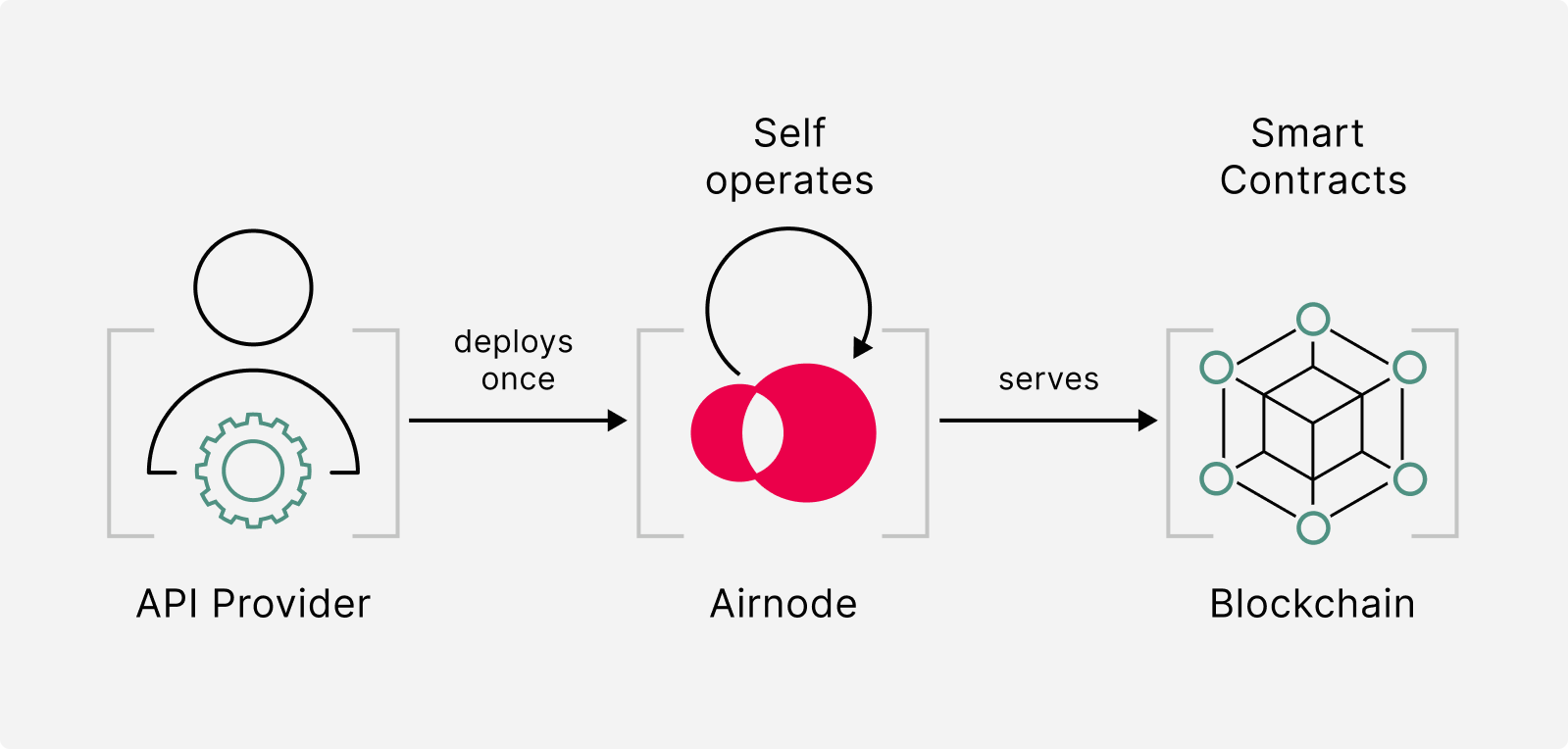
Requesting off-chain data by calling an Airnode
Requesting off-chain data essentially involves triggering an Airnode and getting its response through your smart contract. The smart contract in this case would be the requester contract which will make a request to the desired off-chain Airnode and then capture its response.
The requester calling an Airnode primarily focuses on two tasks:
- Make the request
- Accept and decode the response
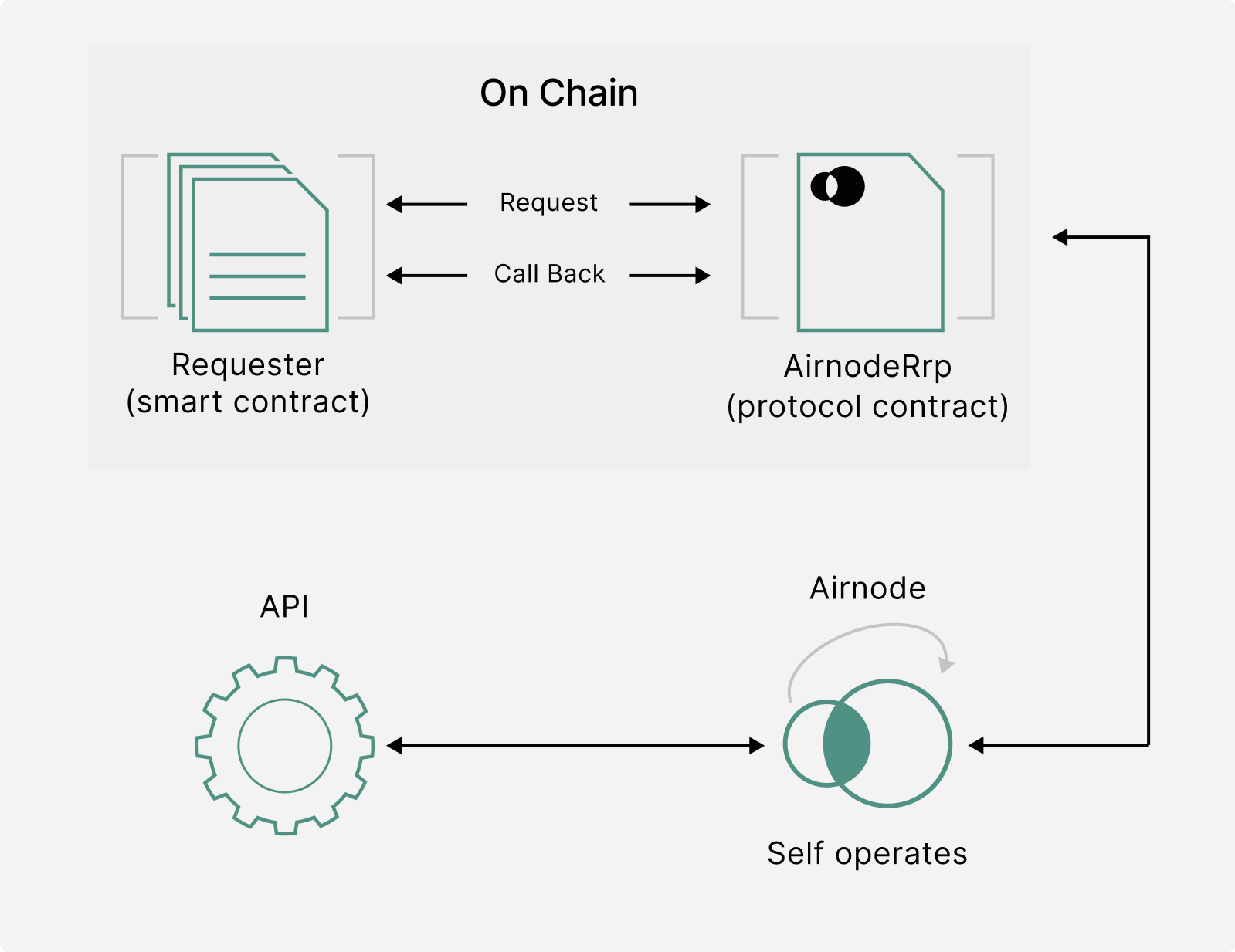
Here is an example of a basic requester contract to request data from an Airnode:
pragma solidity 0.8.9;
import "@api3/airnode-protocol/contracts/rrp/requesters/RrpRequesterV0.sol";
// A Requester that will return the requested data by calling the specified airnode.
// Make sure you specify the right _rrpAddress for your chain.
contract Requester is RrpRequesterV0 {
mapping(bytes32 => bool) public incomingFulfillments;
mapping(bytes32 => int256) public fulfilledData;
constructor(address _rrpAddress) RrpRequesterV0(_rrpAddress) {}
/**
* The main makeRequest function that will trigger the Airnode request
* airnode: Airnode address
* endpointId: The endpoint ID for the specific endpoint
* sponsor: The requester contract itself (in this case)
* sponsorWallet: The wallet that will make the actual request (needs to be funded)
* parameters: encoded API parameters
*/
function makeRequest(
address airnode,
bytes32 endpointId,
address sponsor,
address sponsorWallet,
bytes calldata parameters
) external {
bytes32 requestId = airnodeRrp.makeFullRequest(
airnode,
endpointId,
sponsor,
sponsorWallet,
address(this),
this.fulfill.selector,
parameters
);
incomingFulfillments[requestId] = true;
}
// The callback function with the requested data
function fulfill(bytes32 requestId, bytes calldata data)
external
onlyAirnodeRrp
{
require(incomingFulfillments[requestId], "No such request made");
delete incomingFulfillments[requestId];
int256 decodedData = abi.decode(data, (int256));
fulfilledData[requestId] = decodedData;
}
}
The _rrpAddress is the main airnodeRrpAddress. The RRP Contracts have already been deployed on-chain. You can also try deploying it on Remix
| Contract | Addresses |
|---|---|
| AirnodeRrpV0 | 0xa0AD79D995DdeeB18a14eAef56A549A04e3Aa1Bd |
Request parameters
The makeRequest() function expects the following parameters to make a valid request.
airnode: Specifies the Airnode Address.endpointId: Specifies which endpoint to be used.sponsorandsponsorWallet: Specifies which wallet will be used to fulfill the request.parameters: Specifies the API and Reserved Parameters (see Airnode ABI specifications for how these are encoded). Parameters can be encoded off-chain using@airnode-abilibrary.
Response parameters
The callback to the Requester contains two parameters:
requestId: First acquired when making the request and passed here as a reference to identify the request for which the response is intended.data: In case of a successful response, this is the requested data which has been encoded and contains a timestamp in addition to other response data. Decode it using thedecode()function from theabiobject.
Sponsors should not fund a sponsorWallet with more then they can trust the Airnode with, as the Airnode controls the private key to the sponsorWallet. The deployer of such Airnode undertakes no custody obligations, and the risk of loss or misuse of any excess funds sent to the sponsorWallet remains with the sponsor.
Using dAPIs - API3 Datafeeds
dAPIs are continuously updated streams of off-chain data, such as the latest cryptocurrency, stock and commodity prices. They can power various decentralized applications such as DeFi lending, synthetic assets, stablecoins, derivatives, NFTs and more.
The data feeds are continuously updated by first-party oracles using signed data. dApp owners can read the on-chain value of any dAPI in realtime.
Due to being composed of first-party data feeds, dAPIs offer security, transparency, cost-efficiency and scalability in a turn-key package.
The API3 Market enables users to connect to a dAPI and access the associated data feed services.

Types of dAPIs
Self-funded dAPIs
Self-funded dAPIs are single-source data feeds that can be funded by the users with their own funds. The amount of gas supplied determines how long the dAPI will be available to use. If it runs out of gas, the dAPI will no longer be updated unless it is funded again.
Click here to read more about Self-funded dAPIs.
Managed dAPIs
Managed dAPIs are sourced directly from multiple first-party data providers running an Airnode and aggregated using Airnode's signed data using a median function. The gas costs and availability of Managed dAPIs is managed by the API3 DAO.
Click here to read more about Managed dAPIs.
Subscribing to Self-funded dAPIs��
While Managed dAPIs are just available on mainnets, Self-funded dAPIs are available on both mainnets and testnets. The process to read from a dAPI proxy remains same for both Self-funded and Managed dAPIs.
The API3 Market lets users access both Self-funded and Managed dAPIs.
With Self-funded dAPIs, you can fund the dAPI with your own funds. The amount of gas you supply will determine how long your dAPI will be available for use. If you run out of gas, you can fund the dAPI again to keep it available for use.
Exploring and selecting your dAPI
The API3 Market provides a list of all the dAPIs available across multiple chains including testnets. You can filter the list by chains and data providers. You can also search for a specific dAPI by name. Once selected you will land on the details page where you can find more information about the dAPI.
You can then decide if you want to use Self-funded or Managed dAPIs.
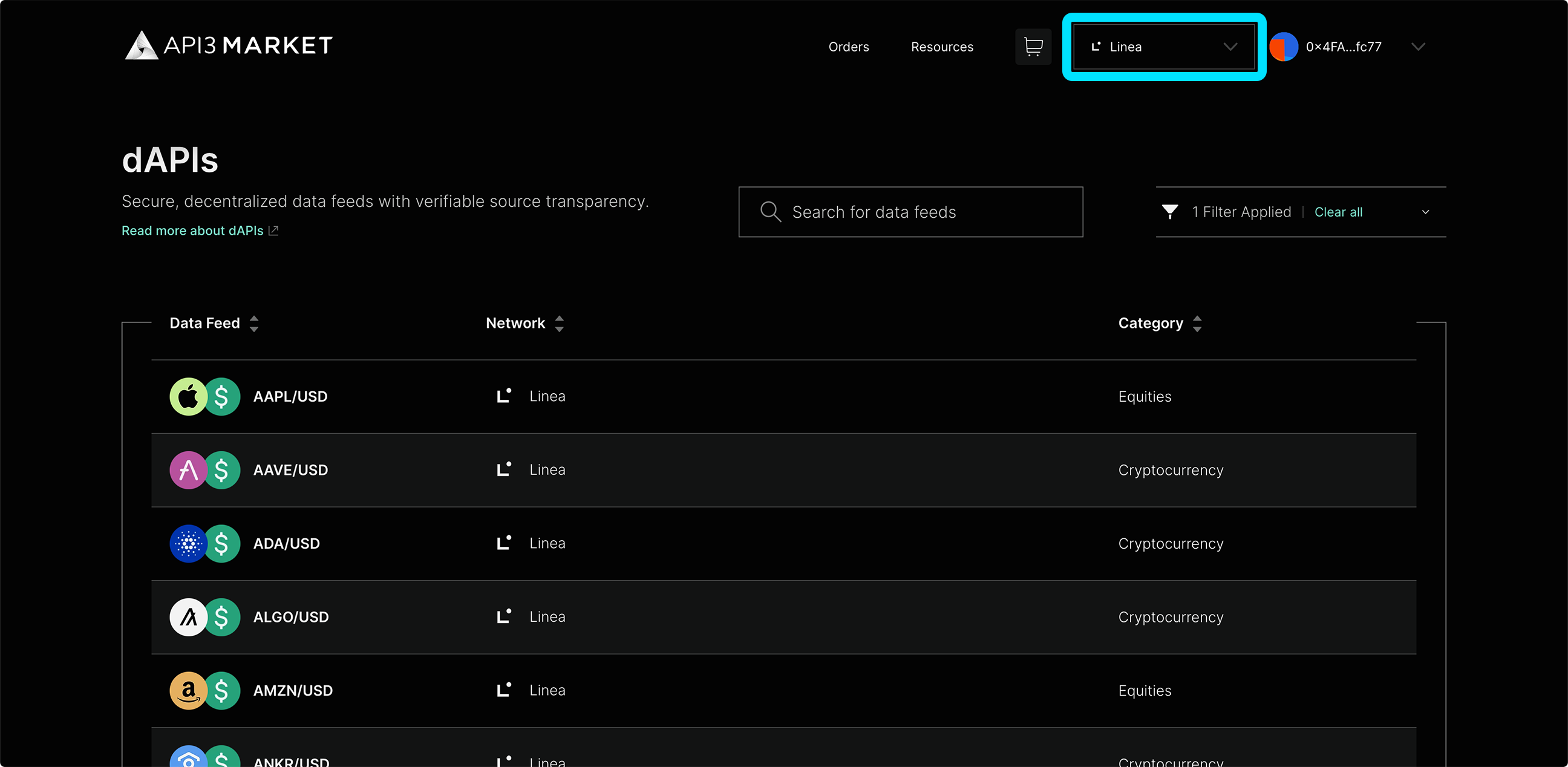
Funding a sponsor wallet
If you are trying to access Self-funded dAPIs, you need to make sure that the sponsor wallet for the dAPI is funded. You can activate it by using the API3 Market and send Matic to the sponsorWallet. Make sure your:
- Wallet is connected to the Market and is the same network as the dAPI you are funding.
- Balance of the wallet should be greater than the amount you are sending to the
sponsorWallet.
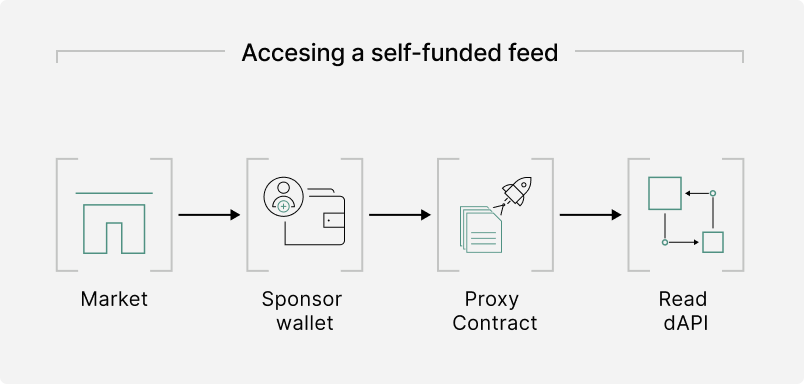
To fund the dAPI, you need to click on the Fund Gas button. Depending upon if a proxy contract is already deployed, you will see a different UI.
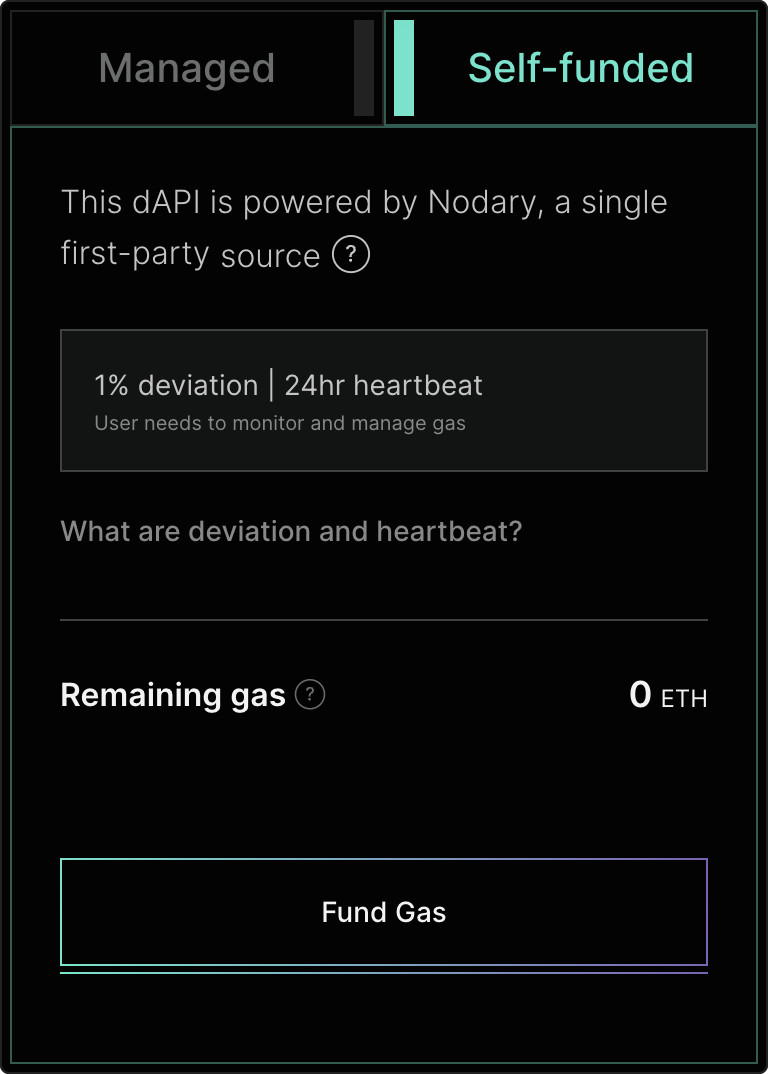
Use the gas estimator to select how much gas is needed by the dAPI. Click on Send ETH to send the entered amount to the sponsor wallet of the respective dAPI.
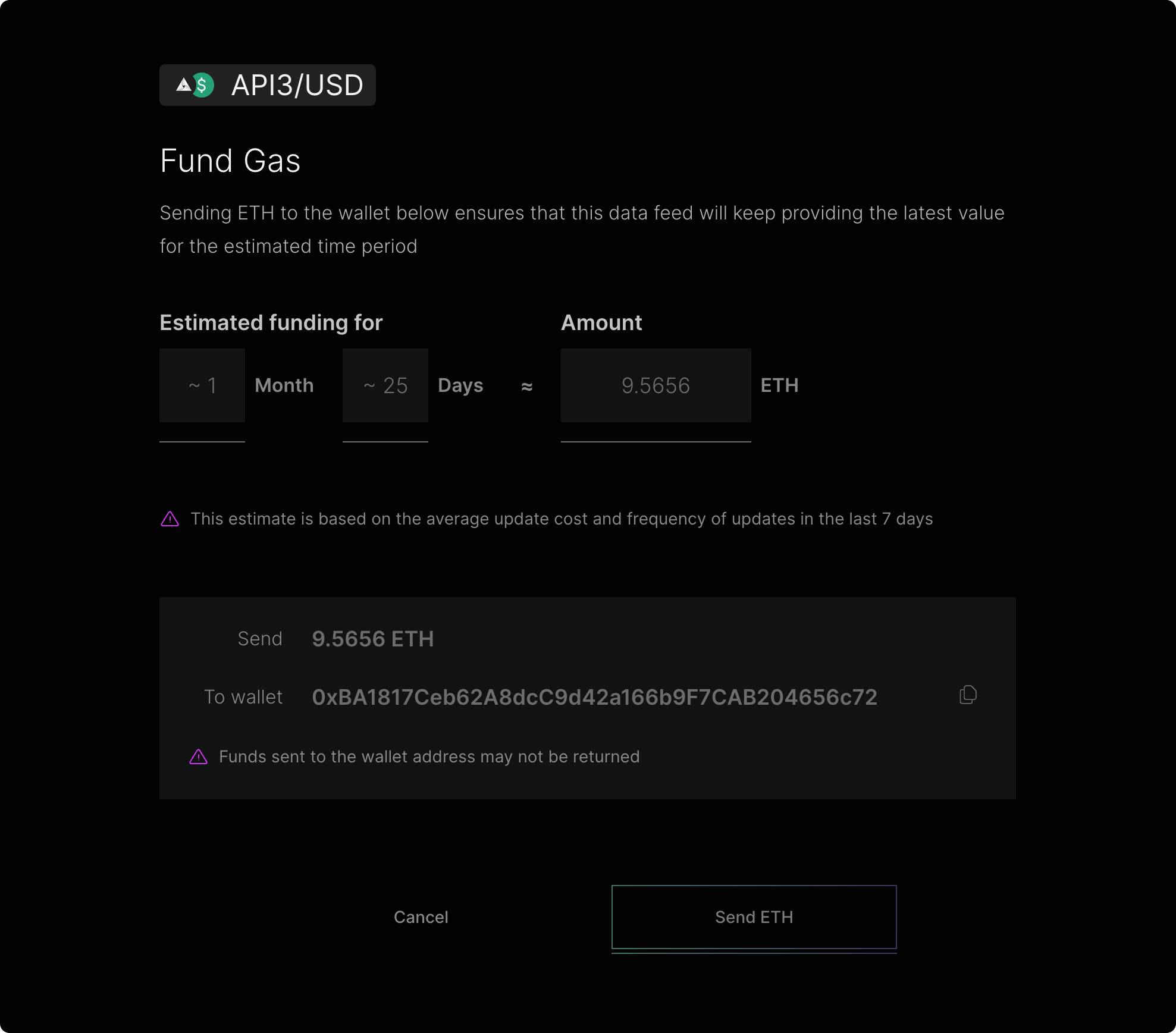
Once the transaction is broadcasted & confirmed on the blockchain a transaction confirmation screen will appear.
Deploying a proxy contract to access the dAPI
Smart contracts can interact and read values from contracts that are already deployed on the blockchain. By deploying a proxy contract via the API3 Market, a dApp can interact and read values from a dAPI like ETH/USD.
If a proxy is already deployed for a self-funded dAPI, the dApp can read the dAPI without having to deploy a proxy contract. They do this by using the address of the already deployed proxy contract which will be visible on the API3 Market.
If you are deploying a proxy contract during the funding process, clicking on the Get proxy button will initiate a transaction to your MetaMask that will deploy a proxy contract.
Once the transaction is broadcasted & confirmed on the blockchain, the proxy contract address will be shown on the UI.
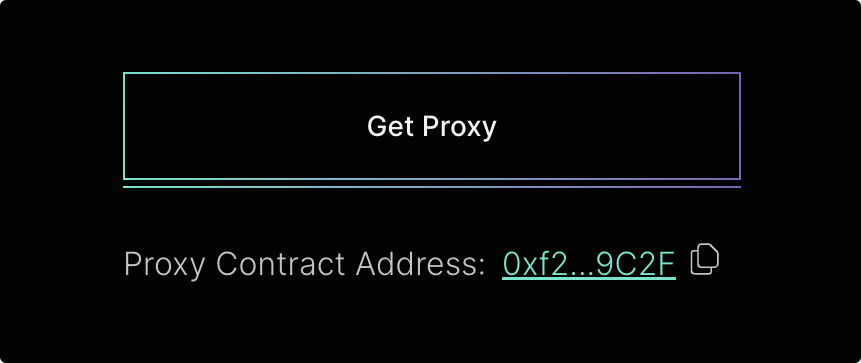
Subscribing to Managed dAPIs
If you are trying to access Managed dAPIs, once you have selected your dAPI, you will then be presented with an option to choose from either Managed or Self-funded. Select Managed dAPIs.
Managed dAPIs gives you an option to configure the dAPI's deviation threshold and heartbeat. For Managed dAPIs, you will have the following options to choose from:
| Deviation | Heartbeat |
|---|---|
| 0.25% | 2 minutes |
| 0.25% | 24 hours |
| 0.5% | 24 hours |
| 1% | 24 hours |
Not all dAPIs support all the configurations. It depends on the asset and chain. Check the API3 Market for more info.
After selecting the required deviation threshold and heartbeat, check the final price, and select Add to Cart. You can add more dAPIs on the same network to your cart. Once you are done, click on Checkout.
Make sure you check the order details and the final price on the payments page. Once you are ready, connect your wallet and pay for the order.
After placing the order, you will have to wait for the dAPI to get updated. It usually takes 5 business days for the dAPI team to update the dAPI for the requested configuration. Once the dAPI is updated, you can start using it in your dApp.
Reading from a dAPI
Here's an example of a basic contract that reads from a dAPI.
// SPDX-License-Identifier: MIT
pragma solidity 0.8.17;
import "@openzeppelin/contracts/access/Ownable.sol";
import "@api3/contracts/v0.8/interfaces/IProxy.sol";
contract DataFeedReaderExample is Ownable {
// This contract reads from a single proxy. Your contract can read from multiple proxies.
address public proxy;
// Updating the proxy address is a security-critical action. In this example, only
// the owner is allowed to do so.
function setProxy(address _proxy) public onlyOwner {
proxy = _proxy;
}
function readDataFeed()
external
view
returns (int224 value, uint256 timestamp)
{
(value, timestamp) = IProxy(proxy).read();
// If you have any assumptions about `value` and `timestamp`, make sure
// to validate them right after reading from the proxy.
}
}
-
setProxy()is used to set the address of the dAPI Proxy Contract. -
readDataFeed()is a view function that returns the latest price of the set dAPI.
You can read more about dAPIs here.
API3 QRNG
API3 QRNG is a public utility we provide with the courtesy of Australian National University (ANU) and Quintessence Labs. It is powered by an Airnode deployed by both of these QRNG Providers, meaning that it is a first-party service. It is served as a public good and is free of charge (apart from the gas costs), and it provides ‘true’ quantum randomness via an easy-to-use solution when requiring RNG on-chain.
To request randomness on-chain, the requester submits a request for a random number to AirnodeRrpV0. The ANU/Quintessence QRNG Airnode gathers the request from the AirnodeRrpV0 protocol contract, retrieves the random number off-chain, and sends it back to AirnodeRrpV0. Once received, it performs a callback to the requester with the random number.
Click here to check out the AirnodeRrpV0 Address and QRNG Providers' Addresses on Linea.
Currently, only Quintessence Labs' QRNG Airnode is available on Linea.
Here is an example of a basic QrngRequester that requests a random number:
//SPDX-License-Identifier: MIT
pragma solidity 0.8.9;
import "@api3/airnode-protocol/contracts/rrp/requesters/RrpRequesterV0.sol";
contract RemixQrngExample is RrpRequesterV0 {
event RequestedUint256(bytes32 indexed requestId);
event ReceivedUint256(bytes32 indexed requestId, uint256 response);
address public airnode;
bytes32 public endpointIdUint256;
address public sponsorWallet;
mapping(bytes32 => bool) public waitingFulfillment;
// These are for Remix demonstration purposes, their use is not practical.
struct LatestRequest {
bytes32 requestId;
uint256 randomNumber;
}
LatestRequest public latestRequest;
constructor(address _airnodeRrp) RrpRequesterV0(_airnodeRrp) {}
// Normally, this function should be protected, as in:
// require(msg.sender == owner, "Sender not owner");
function setRequestParameters(
address _airnode,
bytes32 _endpointIdUint256,
address _sponsorWallet
) external {
airnode = _airnode;
endpointIdUint256 = _endpointIdUint256;
sponsorWallet = _sponsorWallet;
}
function makeRequestUint256() external {
bytes32 requestId = airnodeRrp.makeFullRequest(
airnode,
endpointIdUint256,
address(this),
sponsorWallet,
address(this),
this.fulfillUint256.selector,
""
);
waitingFulfillment[requestId] = true;
latestRequest.requestId = requestId;
latestRequest.randomNumber = 0;
emit RequestedUint256(requestId);
}
function fulfillUint256(bytes32 requestId, bytes calldata data)
external
onlyAirnodeRrp
{
require(
waitingFulfillment[requestId],
"Request ID not known"
);
waitingFulfillment[requestId] = false;
uint256 qrngUint256 = abi.decode(data, (uint256));
// Do what you want with `qrngUint256` here...
latestRequest.randomNumber = qrngUint256;
emit ReceivedUint256(requestId, qrngUint256);
}
}
-
The
setRequestParameters()takes inairnode(The ANU/Quintessence/Nodary Airnode address) ,endpointIdUint256,sponsorWalletand sets these parameters. You can get Airnode address and the endpoint ID here. -
The
makeRequestUint256()function calls theairnodeRrp.makeFullRequest()function of theAirnodeRrpV0.solprotocol contract which adds the request to its storage and returns arequestId. -
The targeted off-chain Airnode gathers the request and performs a callback to the requester with the random number.
You can try QRNG on Linea for free. Check out the all the QRNG Providers for Linea here.
Click here to read more about API3 QRNG
Additional Resources
Here are some additional developer resources